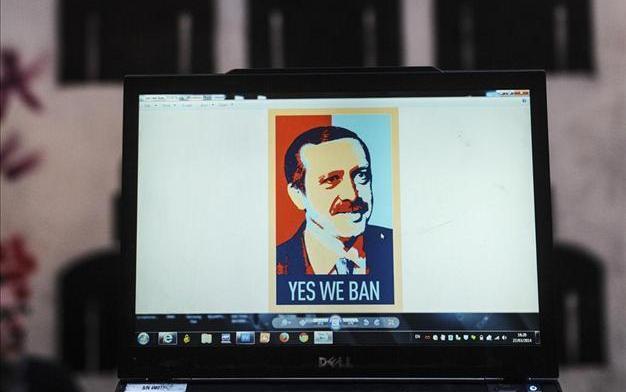Freedom House criticizes Ankara over Internet freedoms
WASHINGTON

Twitter was banned in Turkey in March after President-elect Recep Tayyip Erdoğan claimed it was not abiding by court orders to remove certain links. YouTube was also banned in the same month.
Washington-based watchdog Freedom House has criticized the Turkish government over increasing restrictions on the Internet, describing Turkey as a “battleground state” in Internet freedom in its latest report.The report, titled “The struggle for Turkey’s Internet,” comes ahead of the hosting of the Internet Governance Forum (IGF) in Istanbul in September. It states that Turkey’s hosting of the IGF is timely because of the country’s critical role as a “swing state,” or more fittingly a “battleground state” on issues of Internet policy.
The term “battleground state” was used for Turkey, Freedom House said, in order to describe a place where a young population, improving technology, and international connections could result in a free Internet envied by the world, or where government tactics might provide a model for shutting down a vibrant online sphere.
It also touched on the new Press Law, currently in the committee stage at Parliament, which it said would force broadly defined “Internet news sites” to register and name their owners and authors, echoing a law that went into effect Aug. 1 in Russia.
“After crudely blocking Twitter in March, the government has also now increased its use of court orders to the social media company and is increasingly finding success in getting Twitter to remove content,” it stated.
Twitter was banned in Turkey in March after President-elect Recep Tayyip Erdoğan claimed it was not abiding by court orders to remove certain links. YouTube was also banned in the same month.
“Even more than how it votes at international Internet governance forums, Turkey is a battleground state in how it governs the Internet at home,” the report said. “Because of its position as an OECD and G-20 country, not to mention an EU candidate and a member of NATO, the example Turkey sets is one that other countries facing similar challenges from online speech will be watching. Right now, the contradiction between Turkey’s words at the U.N. and deeds at home only serves to reinforce the belief that international norms can be manipulated in order to curtail domestic freedoms when needed.”
As of December 2012, Turkish users spent the second-most amount of time online on average in Europe, after the United Kingdom, the report also said, with more than 90 percent of the Turkish population aged 15-64 having a Facebook account and more than 70 percent on Twitter. Turkey is also notable for young people’s use of the Internet for news.
“A recent Gallup/BBG survey showed that among 15- to 24-year-olds, the Internet had nearly matched television as a source of news (71 percent for Internet versus 75 percent for TV). The comparable split for 25- to 34-year-olds was 56 percent Internet versus 90 percent TV. Forty-seven percent of the 15-to-24 cohort got their news from social media, all despite the fact that fixed broadband and mobile broadband penetration rates are currently only about half of OECD averages,” the report said.
In a fairly optimistic conclusion, the Freedom House report states that there are structural reasons to hope that Turkey will not be able to consolidate control over the Internet as firmly as countries like Russia and Azerbaijan. “National institutions, including the Constitutional Court and the constitution itself, are stronger in Turkey than in consolidated autocracies. Civil society is more diverse, vocal, and connected to transnational networks. The state is not yet dominated by an all-powerful executive,” it said, also suggesting that Turkey will face pressure from its European partners to improve its approach to the online sphere.
“These factors are unlikely to produce a sudden reversal in the country’s Internet policies or the broader negative trends in governance that are driven by domestic political dynamics. But they will create a drag on authoritarian consolidation and preserve space in which free and independent voices in traditional media and online continue to develop and thrive. These voices are the ones that can help preserve the liberalism and diversity that have gathered strength in Turkey over the last 20 years,” the report added.
















